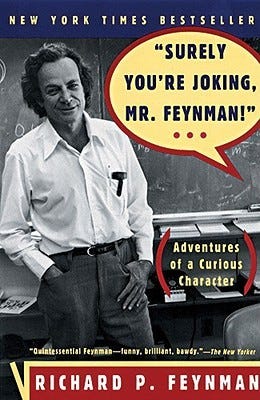5 Powerful Quotes to Change Your Outlook On Life
Apply these lessons to change how you see the world and yourself

Book Review
5 Powerful Quotes to Change Your Outlook On Life
Apply these lessons to change how you see the world and yourself
I was twelve years old when I spotted Richard Feynman’s Surely You’re Joking, Mr. Feynman in my uncle’s library. Back then, the only books I used to read where the thriller/adventure books by Enid Blyton and JK Rowling’s fantasy world of Harry Potter.

Young that I was, I believed memoirs were “boring” and hence, not my type. My uncle, however, urged me to read the back blurb and decide for myself if this gem of a book deserved to be called “boring”.
My uncle is the kind of man who has a library with shelves spanning from floor to ceiling. He must have read more than a thousand books, and he was my role-model as to which books I should be reading. To get such a glowing recommendation from him piqued my curiosity, and I turned the book over to read the blurb. It said-
Richard Feynman, winner of the Nobel Prize in physics, thrived on outrageous adventures. Here he recounts in his inimitable voice his experience trading ideas on atomic physics with Einstein and Bohr and ideas on gambling with Nick the Greek; cracking the uncrackable safes guarding the most deeply held nuclear secrets; accompanying a ballet on his bongo drums; painting a naked female toreador. In short, here is Feynman’s life in all its eccentric — a combustible mixture of high intelligence, unlimited curiosity, and raging chutzpah.
I didn’t understand many of the big words here (chutzpah?), but the first line had me sold. Also, a Nobel Prize winner who cracks safes? This sounded interesting!
And so, unwilling though I was at first, I committed myself to read the book. The first chapter talked about how Feynman figured out how to repair radios when he was eight-years-old and did fancy tricks by coating his skin with benzene and setting it on fire without hurting himself.
I held my breath. This was a man I wanted to read more about.
I am so grateful I finished this book, for it changed my outlook toward life. I learned the value of curiosity, of always being humble, and of never hesitating to ask questions if it meant you could learn something new.
In this article, I am going to share five of the most inspirational quotes by Richard Feynman that will change your outlook towards the world and yourself.
Note: Not all of the quotes are from his memoir; some are taken from his lecture series.
“I would rather have questions that can’t be answered than answers that can’t be questioned.”
Asking questions about the world is okay. In fact, it is one of the most ground-breaking things you can do as a human being.
However, holding an opinion that cannot be changed is not okay because this means you are incapable of learning. When you hold beliefs that are so unshakeable, you relinquish your ability to learn.
You close your eyes to the possibility that you could be wrong, and when you do that, you give up your chance to grow, evolve, and be the best version of yourself.
As Feynman further quoted:
“I think it’s much more interesting to live not knowing than to have answers which might be wrong.”
How you can apply this:
Question authority. Questions textbooks and experts. A seemingly stupid question can give you great knowledge about the world and the subject in hand.
However, once you learn the answers, understand that just like nature is constantly changing and evolving, so is the knowledge base known to humankind. Be open to conflicting opinions and do not shut down someone who speaks something that is contrary to your beliefs.
Likewise, be open to having your beliefs questioned. If you cannot provide them with a satisfactory answer, maybe it’s time to start looking for different solutions?
“We need to teach how doubt is not to be feared but welcomed. It’s OK to say, “I don’t know.”
Feynman was a firm believer in the practice of questioning everything he saw. His inquisitive nature helped him master varied skills from playing the congo to cracking safes, not to mention his mastery in the field of quantum mechanics.
Curiosity and self-improvement go hand-in-hand. When you say you don’t know, you open yourself up to receiving the abundant knowledge in the universe.
If you bottle up your doubts and pretend to understand when everyone else is nodding their heads, you will miss out on the chance to learn.
There should be no shame in owning up to the fact that you don’t know everything, especially when a celebrated scientist like Feynman had the confidence to say this:
I’m smart enough to know that I’m dumb.
How you can apply this:
Do not feel that you might be exposing your lack of comprehension when you say “I don’t know”. In reality, you are asking questions so you can understand the concept better.
And when you understand the core logic, your grasp on the field will be tighter, and you will remember the subject for longer.
Our society works on the principle that asking questions is wrong and anyone who admits they didn’t quite understand is dumb. That somehow, being “dumb” is something to be ashamed of.
It is high time to let such a belief go and unlearn this lesson. Only when we are confident enough to accept we don’t know everything, we can learn more and broaden our knowledge.
“All the time you’re saying to yourself, ‘I could do that, but I won’t,’ — which is just another way of saying that you can’t.”
This quote struck a chord with me because when I was in school, a lot of my friends kept pointing at the class topper and saying, “If I studied as hard as them, I would be the topper, and they would stand no chance.”
Back then, I didn’t have the clarity of thought and the confidence to say this to their faces, but it always made me wonder — if they were so sure they could out-perform the topper, what was stopping them?
Something told me this was envy, and their claim had no purpose other than to belittle the fruits of someone else’s labour.
When I read Feynman’s book, this quote validated my concerns. It made me understand this basic tenet of human behaviour: not doing something out of choice and not doing something because of constraints are the same — the end result ensures that you won’t get the job done.
When you don’t achieve something, claiming that you could have done it makes no difference.
How you can apply this:
Rather than building scenarios in your head where you are more successful than the people you are envious of, create your ideal version of reality. Work on yourself so you can set an example that makes other people look up to you.
Stop hiding behind the convenient excuse of “I could have done it if — ”
Whatever reason you think is stopping you from achieving your goals is probably a limiting self-belief you need to let go. If you set your heart to something, no force in the world can stop you from achieving that. Stop wasting time complaining or nurturing jealousy in your heart, but work on yourself so you can achieve your fullest potential.
“I have no responsibility to live up to what others expect of me. That’s their mistake, not my failing.”
So many times, we measure our self-worth by the way the world views us. We judge ourselves too harshly if we fail to live up to the expectations the people around us have and end up living a life where the greatest happiness is derived when we make others happy.
But like everything else, Feynman had a radical approach to this.
According to him, when someone expects something of you, it says nothing about you and everything about them. You don’t owe them anything just because they have some expectations.
There is an unbelievable sense of liberty when you learn to separate your self-judgment from the expectations of others. After all, not giving them what they wish is not your fault, is it?
How you can apply this:
Cultivate a healthy sense of self-worth and do not attach it with what value others assign to you. Understand that true freedom can be achieved when you no longer care about what others think of you.
Even if that someone is a close friend or a family member, remember this: you do not owe them anything.
For example, if your parents wish you to be an engineer but you feel your true calling is to be an artist, accept the fact that even though they are your parents, this life is yours, and hence, the decision of what to do with it resides solely with you.
If you cannot make them happy, it does not make you a failure. It simply means that they had the wrong expectations from you. Acknowledge this fact and move on. There is nothing much you can do about this.
“Of course, you only live one life, and you make all your mistakes, and learn what not to do, and that’s the end of you.”
Maybe that is all there is to life: you make your mistakes, and these mistakes, in turn, teach you what is not to be done.
Maybe you don’t need to worry so much about what is right and what is wrong each step along the way. Maybe the only way to live life is to just live it. If something does not work out, you can always retrace your steps, call it a “lesson”, and never traverse down that path again.
How you can apply this:
Live life with no regrets. If your heart tugs you in a particular direction, follow it, no matter how far off it might veer from your “destined” direction of life. If you are not meant to end up there, you will see warning signs along the way.
You would reach where you are meant to be, or you would learn a lesson about what not to do. Either way, you are gaining a positive outcome or valuable insight.
There is nothing to be gained by second-guessing every single decision you take. If something feels right, just do it. Let your mistakes define you. Let them be stepping stones to better times rather than shame weighing you down.
Final Thoughts
Richard Feynman was the person who inspired me to pursue a life of science. The fact that I am a civil engineer today is probably because of the seed of curiosity that was planted in my head when I read his book in my uncle’s cosy library all those years ago.
Feynman’s words are inspiring and motivating and make you feel that there is no end to the things you can achieve if you try hard enough. Like he famously quoted,
I was an ordinary person who studied hard. There are no miracle people. It happens they get interested in this thing and they learn all this stuff, but they’re just people.
His words are capable of lighting a flame of hope in every heart. I hope I was able to do justice to some of his most inspirational quotes. Please share any anecdotes of how Feynman’s life inspired you to take charge of your own.
For book reviews and recommendations, follow me on Goodreads.
